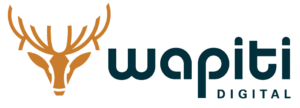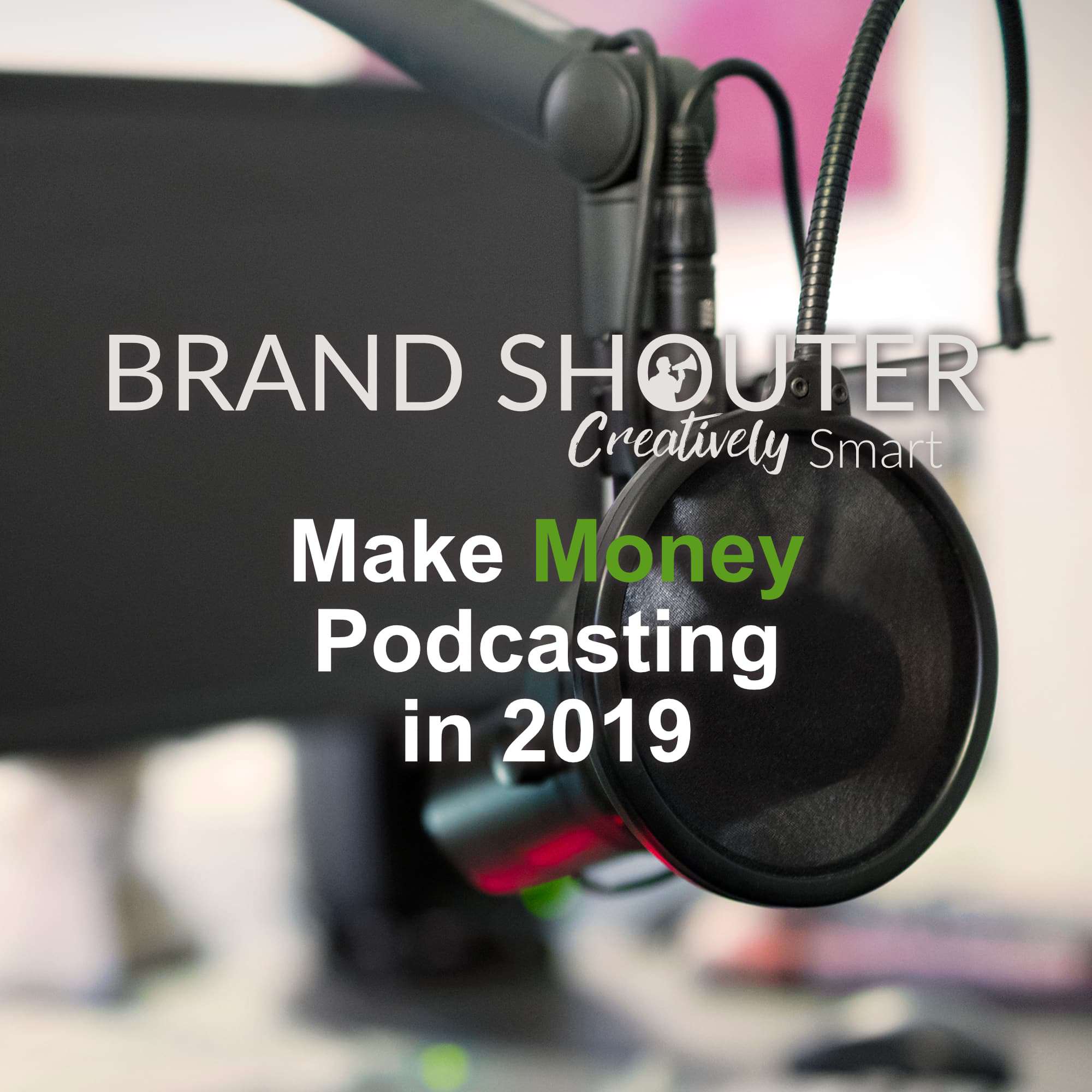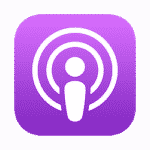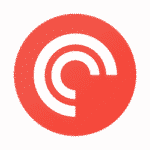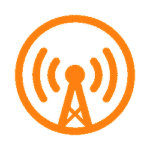If you own a business, a podcast could be a huge lead generation funnel for your business. If you sell a product or service that has any kind of story behind it, you can use a podcast to establish yourself as an industry expert and help potential clients choose you when the time comes. This podcast should help you get started on your journey to make money podcasting in 2019.
Note: This is an update to my older “Make Money Podcasting” article. That article still contains very good information and I highly recommend checking that article out as well. This article, however, has more up-to-date information, equipment, and programs. Also, I’ve learned a lot since that article as well.
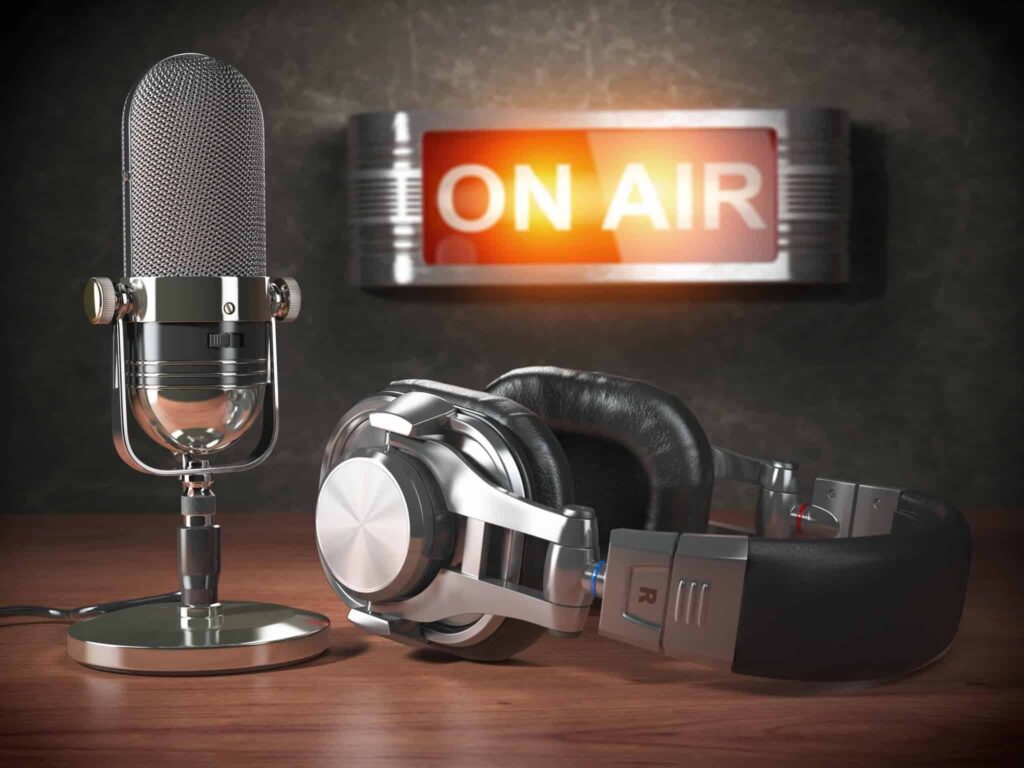
I love to talk, and if I could, I would make a living just talking. I really don’t like public speaking, but one on one, you can’t get me to stop talking. If you can envision yourself talking about what you do, what your company creates, who it’s connected to, or maybe even interviewing some clients or other businesses that you work with (i.e. vendors and so forth), then you can create a wealth of extremely usable content just by talking into a microphone. As for me, anybody who wants to subscribe to my podcast can listen to what I have to say. I also include it on my website and people can press play and listen to it on the website. I totally understand how another business owner would stop and think, “I have no time for this. I have too many demands already!” I get it.
You see, I started podcasting as another marketing tool that I could offer to my clients. I practiced doing podcasting myself in order to get good at it. I quickly realized there was a lot that went into it: getting the right equipment, spending the time to figure out what I’m doing, making professional artwork for every single episode, and I actually paid for a professional intro/outro. This was a huge undertaking and I’m already pretty busy. I created what is ultimately a separate business within my business to be a service to my clients and to future clients. Ultimately, this is why you should have a podcast partner – a company that is willing to take your recorded audio and do all of the editing and creation steps for you. Here’s a huge bonus to podcasting. Through this process, I found that with the right programs and the right setup, you can actually turn your podcasts into text and social media content.

For your business, podcasting is probably not going to be your next independent revenue stream, but it will support your existing revenue streams. As an example, perhaps you’re selling a vegan nut bar or some other kind of vegan bar. You can podcast your whole story about why being vegan is important, you can provide other vegan recipes as a support, you can talk about your product, you can link to articles that explain why veganism is important, and maybe even connect with other vegan places in the local area. This gives you all sorts of content, and as you should know by now, content is what is important for your website.
Podcasting is all about what’s important for your business, and it’s how you communicate with your clients. I do want to say it’s super important that you spend time practicing. Once you get all the pieces set up don’t just start podcasting. That’s what I did. If you go back and listen to the first couple of podcasts I did, they’re not so great. You want to have some practice so you have some comfortability in front of the microphone. You want to sound like you care, so you need passion.
Recommended Podcast Resources For 2019:
- Microphone – Audio-Technica ATR2100-USB Cardioid Dynamic USB/XLR Microphone
- For Recording Multiple Speakers – Blue Yeti Mic
- Good, Inexpensive Studio Headphones – Samson SR850 Semi-Open-Back Studio Reference Headphones
- Mic Accessories Kit – Scissor Boom Arm, Universal Pop Filter, & Wind Screen for Blue Yeti Mic
- Podcast Recording Program – Garageband (Mac) | Audacity (PC)
- Podcast Hosting Platform – Transistor.fm
- Transcription Service – Descript (great price and accuracy – Get 30mins FREE!)
- Social Media Posting – Social Pilot
- All of your website needs – Wapiti (ha – got ya there!)
Equipment Basics for Recording Podcasts
Microphone:
Let’s start with some of the basics. I currently use an external microphone made by Audio-Technica: an ATR2100 Cardioid Dynamic USB/XLR microphone. When I began podcasting, I used a Blue Yeti microphone. They sell for about $125/$150 new on Amazon. The Yeti provides one-way, bi-directional, and stereo recording so you can actually set up for two or three people around a mic and have a conversation. The Yeti mic is great if you have a nice non-echoey room. However, in my office, it picks up a lot of background noise (like the buzzing of the fluorescent lights and they’re not even that loud). I’m keeping my Yeti even though I’ve replaced it. I will be using it in the future for a fun podcast I run, but for business recording, I’m recommending the ATR2100. This was actually recommended to me by the podcast hosting platform that I will recommend below.
The Audio-Technica ATR2100 is what they call a cardioid dynamic mic. It has a USB connection which is important if you’re just a standard computer podcaster and you’re not using all the audio equipment, but it also does have the XLR plug if you do have the audio equipment. It’s a mic that you have to get pretty close to and talk directly into it as it is designed to only pick up the person speaking in front of it. You can hear the difference if you back up or change the direction of your head. It was $64 on Amazon; less than half the price of what I paid for the Yeti. So if you’re looking for a good mic, that’s the first step recommendation.
Recording Software:
If you’re a Mac user like I am, GarageBand is amazing. It works well, but you do want to spend some time reading online on how to properly set it up. This article won’t give you the details like that because there are actually a lot of adjustments that you can do to make yourself sound better. However, even the default settings worked great for me; I didn’t have to change a whole lot. Also in GarageBand, when you export your audio, it normalizes. So if you’re a little quiet or a little loud, it helps bring you more into balance. That said, GarageBand is free for Mac users and it’s pretty awesome. Also, for Mac or Windows users, there is the program Audacity (I’d recommend GarageBand over it for Mac users, though). For Windows users, Audacity is the best there is and it’s also a free download. So between those two programs, a computer to download it all with, and a mic, you will be set for recording your podcasts from a very basic standpoint.
Microphone Accessories:
Now, if you want to get a little bit more professional, I would recommend some studio headphones. I bought the Samson SR850 Semi-Open-Back Studio Reference Headphones. As it turns out, if you don’t get studio headphones, you’re actually getting headphones that alter the audio quality. One prime example would be Beats headphones. Everybody loves Beats and they have that sexy appeal that Apple seems to give things, but the reality is Beats headphones actually boost the bass a little bit and alter the audio quality based on what they feel would make music sound better, and that’s good if you’re listening to music you may really appreciate that. But when you listen to yourself while recording, you don’t want to sound different. You want to sound exactly how you sound – if somebody else’s headphones adjust your sound, that’s fine – you want to make sure you sound great at a normal sound. As mentioned, I’m currently using these Samson SR850 headphones. They were inexpensive (just under 30 bucks). Of course, there are other headphones that other places recommend, but I think the important thing is that you find the right kind of headphones and that they work well for you. You can always spend $400 on studio headphones, but I don’t think that’s necessary.
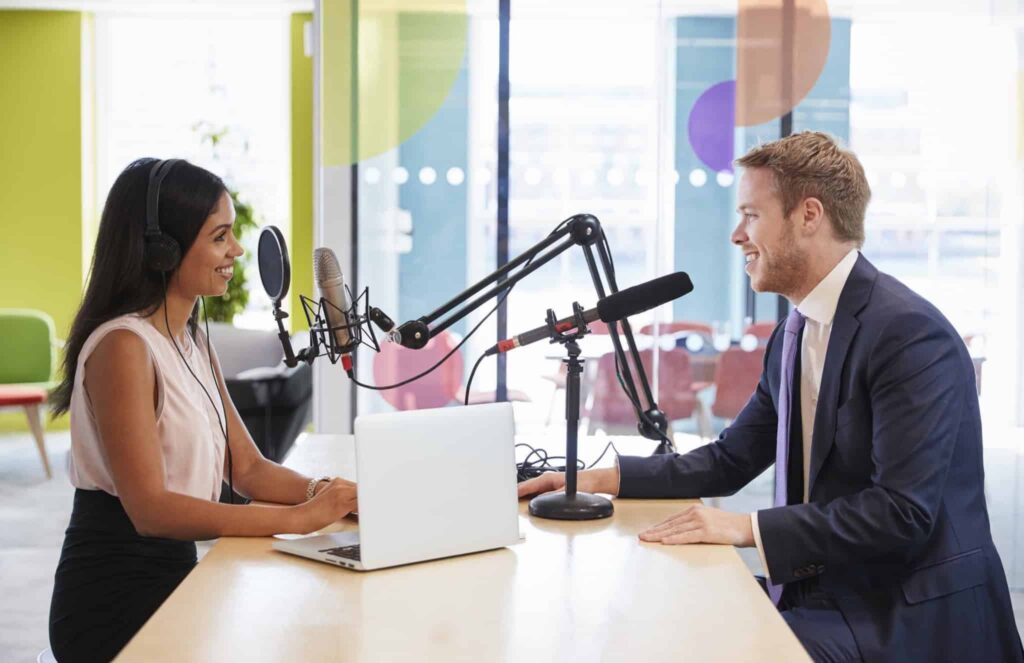
Next, I recommend a boom scissor arm. This is a holder for your microphone that you attach to your desk and it sticks out and holds the mic right in front of your face. When you’re done recording you can quickly rotate it out of the way and get back to life. I have my mic attached to my desk 24/7 (unless I take the mic for some reason to talk to somebody); it just stays attached to my desk on the boom scissor arm, and I swivel it in and out of my way as I need it. The scissor arm itself comes with an attachment, so depending on the mic and the arm you have it’s guaranteed to work. I bought my particular scissor arm when I was just using the Blue Yeti and it worked great for that. When I got my current mic it again worked great. So I imagine that, as long as you get a well-rated mic and a well-rated scissor arm, you’re going to be fine. The arm I bought comes with a “pop filter,” which is a bendy arm with a round screen that goes in front of the mic. The pop filter helps with your p’s, b’s, and d’s – any letter that has a bit of a “pop” to it – to make it so they don’t cause feedback or any other issues. It also came with a little fuzzy windscreen for the Yeti which does not fit the ATR mic that I recommend but works great on the Yeti if you pick that up in addition.
That’s all the equipment I use: a mic, an arm, a pop filter, the computer, and Garageband for me (or if you have a Windows computer you can use Audacity). That’s the basics of getting yourself ready to record. Once you’re set up to record, remember, practice over and over and over. Record yourself doing different things so you realize when you do things like talking and turning your head, which might cause you to fade out. That’s something you should be fixing. You will want to play with various things like that as you are recording, so keep the headphones on so you can hear how you sound.
Programs/Platforms to Support Your Podcasts
Podcast Hosting Platform:
So now I’m going to get into podcasting programs or platforms, some necessary and some beneficial, that will help make your podcasting even better. There is one platform in particular called Transistor that I found based on another podcast and the guys at Transistor are amazing. I signed up for Transistor based on the Money Labs podcast (if you’re into money management and learning how to increase wealth, Money Labs is a great podcast to listen to); they mentioned Transistor.fm in passing on an episode. They talked about how they liked it but didn’t get into a whole lot of detail. At the time I was using SoundCloud and had to pay for a separate account for each podcast even though my podcasts were new and not getting many listens. I thought I would check it out because the guys behind Money Labs have multiple podcasts. I was wondering if maybe this fixes a problem, and sure enough, you can host as many podcasts as you want. Your pricing increases based on how many downloads you have per month. So you can be a novice and record for a long time before your price goes up.
The initial price of Transistor is $19/month, which is a great value and that includes two users. So if you do a podcast with someone else you can give them access to it. You get unlimited shows and unlimited storage. They have some pretty nice analytics; they’re not too advanced but they’re enough to show you what’s going on. You get up to 5,000 downloads a month. So as long as you’re not breaking 5,000 a month you don’t have to ever upgrade. Once you break 5,000 downloads a month, you’ll upgrade to the professional plan, which is $49 a month. Their professional plan also includes up to five users. For example, Wapiti hosts podcasts for clients as well as ourselves. I can allow one of my clients to have a user account and access their account while I help them take care of the management of that. Once again, you get the same podcast analytics but you get up to 15,000 downloads a month. Their biggest plan ($99/month) gives you up to 45,000 downloads a month, and I’m sure they’ll work with you if you break that amount.
Transistor.fm has great service – the platform is really easy to use and really nice – but what I appreciate most is their amazing customer service. They Intercom on their site (Intercom is a customer service chat portal type thing) and when I’ve run into issues (mostly because of me) they’re immediately there. One day I got even received an email from one of the guys at Transistor reaching out to me that said, “Hey, I love the content of your podcast and your artwork looks great. The audio quality, however, is poor.” And lo and behold he recommended the mic that I recommended earlier and it’s made a huge difference. He also sent me to a course he build and gave me free access to it to learn how to podcast even better. Now that’s customer service you don’t find anymore and that’s enough to really shout about a company from the rooftops. One other thing that they do, which I’ve only seen in a couple of other hosting platforms, is when you upload your podcast you can also assign a YouTube sized image and it will auto-create a YouTube video with a static image with your podcast and auto-upload it to your YouTube account. This is major for exposure and it’s a really awesome additional service.
Transcription Software:

If you record podcasts and you’ve ever tried to do transcription, you know how much time and how big a headache it is to do transcription. Oftentimes, companies will just outsource transcription and find somebody in another country who works for far less. Enter Descript. Descript a piece of software for Mac and PC. You simply upload your audio, it sends the audio to the server and comes back with a transcript. My fun podcast is me and another guy talking about soccer. Descript has a hard time with two guys talking over each other but if it’s either two people who are not interrupting each other frequently (like some of my interviews that I’ve done for the Business Growth Podcast) or if it’s just one person talking (like I do), it does a really good job. Descript claims 95% accuracy and I think that’s probably pretty close. You just have to go through and more or less proofread.
With Descript, you get 30 minutes free when you sign up. The price is great: if you don’t have an account with them, It’s 15 cents for a minute. I pay $10 a month for their service which gives me audio editing through the software if I want. You also get transcription for only 7¢/minute. So it’s kind of like pre-paying in advance and you can lower your transcription costs. I highly recommend Descript for creating the content that you need to push your podcasts out across other places. A transcription also gives you written content for social media posts, blog posts, and emails. Written content is awesome and anytime you can turn audio into written content, that’s gold.
Social Media Publishing:
The last tool that I’m going to recommend in this post is a program called Social Pilot. Social Pilot isn’t podcast specific, it’s a good business program. Social Pilot specifically handles all of your social media scheduling and much more. Wapiti uses it to schedule our posts and allows me to quickly post to Instagram, which is a big bonus because Instagram doesn’t allow auto-posting. Wapiti uses it for Facebook, Twitter, Instagram, Google “My Business” and LinkedIn. We’ve got all those accounts set up in Social Pilot and once every week I go through and create my posts and get them set up for the next week so I don’t have to think about it. I can also tell it to repeat those posts over time which gives me more content for the future. So the more you use it, the more content continues to show up, and the more you tend to fill the funnel of social media for your business. The lowest tier of Social Pilot is $10/month paid monthly. It’s less if you pay annually, so you get a little bit of savings.
When you produce your podcast and get it all finished, you need to get it out there so people can find it. Podcasting services such as iTunes/Google Play Podcasts/Spotify/Stitcher/etc. are great for getting your content available – not necessarily so much for getting found. Integration on your website through Transistor, YouTube videos, etc. are also very helpful. All of those services in and of themselves aren’t enough. Getting yourself out on social media is a must and helps you get connected to the right people to push your brand out more. This is true of everything, not just podcasting, but it’s super crucial with your podcast because you need to make sure people are hearing the work you do.
Recommended Podcast Resources For 2019:
- Microphone – Audio-Technica ATR2100-USB Cardioid Dynamic USB/XLR Microphone
- For Recording Multiple Speakers – Blue Yeti Mic
- Good, Inexpensive Studio Headphones – Samson SR850 Semi-Open-Back Studio Reference Headphones
- Mic Accessories Kit – Scissor Boom Arm, Universal Pop Filter, & Wind Screen for Blue Yeti Mic
- Podcast Recording Program – Garageband (Mac) | Audacity (PC)
- Podcast Hosting Platform – Transistor.fm
- Transcription Service – Descript (great price and accuracy – Get 30mins FREE!)
- Social Media Posting – Social Pilot
If you’re interested in how podcasting can help you grow – we can help.
